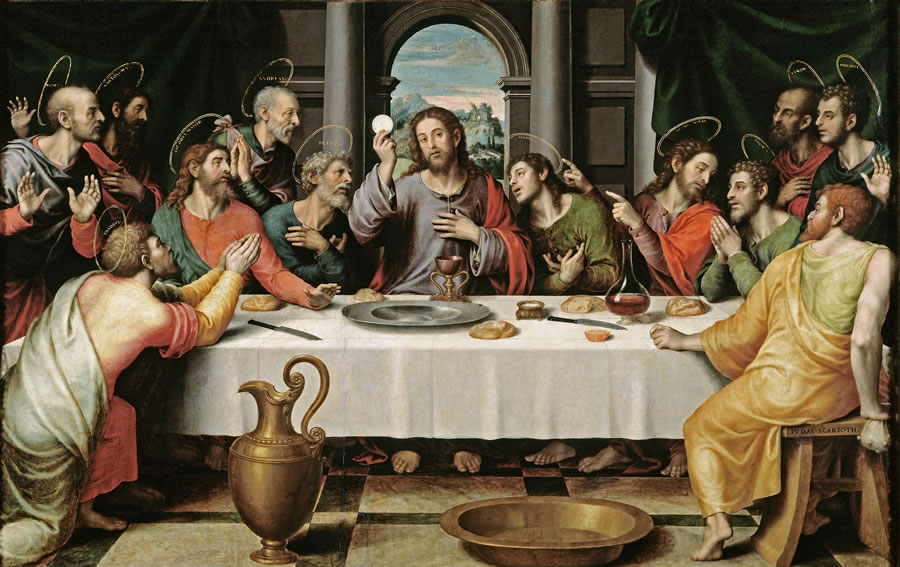
Corpus Christi
06-03-2018Weekly Reflection©2018 Liturgical Publications, Inc.In our modern times, symbols can seem to have lost its value. The most recognizable "signs" are ones we see on the road or the branding in advertisements. The logos for major companies don't do much more than perk our interest or disdain. They surely don't deliver on their promises for our lives to be happier, healthier, and easier.
On this feast of Corpus Christi, we hear the account of the Last Supper. This was Passover, an ancient sign of the covenant of Moses. The Hebrew people celebrated God's providential care for His people. To the listening disciples, Jesus makes a very bold claim. "This is my blood of the covenant." At the time of the first Passover -- the redemption of the Hebrew people from slavery to the Egyptians -- the blood of the sacrificial lamb was spread on the lintels of the doorpost. Tomorrow, some of the disciples would witness the blood of the new covenant spread across the wood of the cross.
Christ's Body and Blood are more than a sign. They are a sacrament. In the sacrament, the sign makes real what it signifies. More than ritual, a sacrament enacts truth of the covenantal love of God and His promise of fidelity. It's a promise God keeps. The same bread and wine of that first Holy Thursday liturgy becomes -- throughout the centuries and until the end of time -- the very Body and Blood of Christ. On this feast, we celebrate the unfailing covenantal love of our God. As you partake in the Eucharist today, and next Sunday, and the Sunday after that, remember that you receive neither a meaningless sign nor an empty offer. You receive God Himself, as He fulfills His promise to remain with us always.
La fiesta de este domingo es como repetir o recordar lo que celebramos hace unas semanas el día del Jueves Santo. Jesús hizo por nosotros algo imposible de imaginar en la mente humana. Se dio a sí mismo. Su Cuerpo y su Sangre, comida del cielo para la salvación de todos nosotros. Este es el misterio que celebramos el Jueves Santo y este domingo. Jesús envía a dos de sus discípulos diciéndoles: "Vayan a la ciudad, y les saldrá al encuentro un hombre que lleva un cántaro de agua" (Mc. 14:13). De esa forma encontrarían el lugar para preparar la Cena del Señor.
Notemos que en Marcos no se menciona la Pascua judía, el cordero, el paso del Mar ni la muerte de los guerreros egipcios. La cena pascual en Marcos es la cena de Jesús, en ella no se mencionan actos de violencia. Al contrario, el sacrificio del Señor es fuente de vida eterna para toda la humanidad de todos los tiempos. Ahora, la Eucaristía es la presencia viva y constante del Señor Jesús por medio de su Cuerpo y su Sangre. ¿Cómo honras la presencia del Cuerpo y la Sangre del Señor? ¿Al comulgar lo haces con reverencia?
Recuerda las palabras hermosas de Jesús: "Esto es mi Cuerpo, esta es mi Sangre" (Mc. 14:22-25). Y reflexiona en la siguiente pregunta. ¿A qué nos compromete recibir el Cuerpo y la Sangre de Cristo cada domingo en misa? Sabiendo que actualmente vivimos en un mundo de violencia y corrupción, no debe existir duda para nosotros. Jesús es amor y nos invita a dar amor a nuestro prójimo. Por lo tanto, la Eucaristía debe animarnos a practicar la justicia siempre.
BACK TO LIST